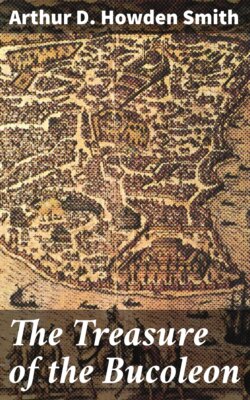Читать книгу The Treasure of the Bucoleon - Arthur D. Howden Smith - Страница 6
На сайте Литреса книга снята с продажи.
CHAPTER IV
THE GUNROOM AT CASTLE CHESBY
ОглавлениеTable of Contents
The inimitable Watkins met us at Chesby station with a motor in which we were whirled off through mirky woods and a half-seen park to a low, rambling building of varying architecture set on the summit of a saddle-back hill. Lights showed in one wing, but the center and other wing were dark.
"I'm very sorry, your ludship," apologized Watkins, as he assisted us from the car in front of a Tudor archway. "It's been some years since the 'ouse has been opened. Your uncle, 'e was used to living 'ere in the Old Wing, and we're under-staffed, if I may say so, your ludship, for—"
"It suits me, Watty," returned Hugh. "My friends are not company, and of course, we shall not entertain. It would be foolish to open up the entire place."
He stood on the doorstep, glancing around him at the thick, ivy-draped walls and the machicolated parapets which lined the roofs.
"Welcome to Chesby, you chaps," he hailed us. "It gives me a thrill to come here. I haven't seen it since before the war, except for one brief visit two years ago, and I haven't really lived here since I was a lad."
A butler no less dignified than Watkins held the door open for us, and a palsied footman strove with the valet for custody of our scanty baggage. Watkins motioned both aside when we entered the high-pitched hall.
"This way, if you please, your ludship and gentlemen," he said. "I 'ave 'ad supper served in the Gunroom. 'Is late ludship used it as a snuggery, as 'e called it, Mister Hugh—beg pardon, sir, your ludship—and far more cheery it is, sir, with a bright fire and all, than the other rooms."
"That's fine," approved Hugh, and he led us after Watkins through a short passage to the right and into a big room, with mullioned windows, deeply-embrasured, and carved oaken rafters and stone walls showing above the rich paneling that rose a tall man's height from the floor. At one side was a vast fireplace, with chimney-piece, ingle-nooks and over-mantle elaborately carved. A log-fire blazed on the dogs, and before it, warmly illuminated, a table was set with snowy linen and silver emblazoned with the Chesby crest, a mailed arm clutching a dagger and beneath it an open eye, with the motto "I search."
Hugh rubbed his hands with satisfaction.
"This is home," he said.
But a shadow instantly chased the smile from his lips.
"And if Bellowes is correct, it will continue to be my home only if we succeed in finding something lost more than seven hundred years ago," he added.
"If it is to be found we shall find it," answered Nikka. "What a beautiful room!"
"I was going to say the same thing," I said. "As an architect, I have tried to achieve this effect for rich Americans, but I must admit I can't do with mere money what time and many men's imaginations have accomplished here."
"And women's imaginations, too," replied Hugh. "This is the oldest part of the castle, but it has felt the influence of that redoubtable Lady Jane you heard about this afternoon. I believe this wing is supposed to be the remains of the Angevin keep and Great Hall of the first Hugh's castle, which were partially destroyed in the Wars of the Roses, and again by fire in Bloody Mary's time. Lady Jane rebuilt this wing and joined it with what was then the modern, and early Tudor, central mass."
Curious, I stepped over to the fireplace and examined the splendid carvings in deep relief that adorned stone and woodwork. High up near the roof on the over-mantel I discerned the family crest, together with numerous heraldic shields in colors faded and dimmed. But the most curious feature of the ornamentation was a lower panel supported by a group of bibulous monks in comically disordered attitudes. On the panel appeared to be lettering.
"Watkins," I called, "bring me a candle, please."
He lifted a weighty candelabra from the table and carried it toward me, Hugh and Nikka trailing him like small boys eager to view anything new. As he held it aloft, arm-high, the soft light shone on four lines of Gothic lettering which had once been gilded. They showed clearly in the age-old oak of the paneling:
Whenne thatte ye Pappist Churchmanne
Woudde seke His Soul's contente
He tookened up ye Wysshinge Stone
And trodde ye Prior's Vent.
"I had forgotten that," exclaimed Hugh. "It's some more of Lady Jane's poetry.'
"She seems to have been rather hipped that way," I suggested.
"Now you speak of it, I can't recall any other specimens of her wit in rhyme," answered Hugh, puzzled. "Can you, Watty?"
"No, your ludship. 'Is ludship, your late uncle, made a careful examination of Lady Jane's papers, but 'e found no other verses."
"But what was her idea here?" I persisted, for the whimsicalness of the thing interested me.
"Oh, as I told you, she was virulently anti-Catholic," said Hugh carelessly. "It was she, you know, who sealed up the old family crypt and built a new one in the Priory, as the parish church is called. She probably believed that the former monks of the Priory had been more interested in their wine-cellar than in masses."
